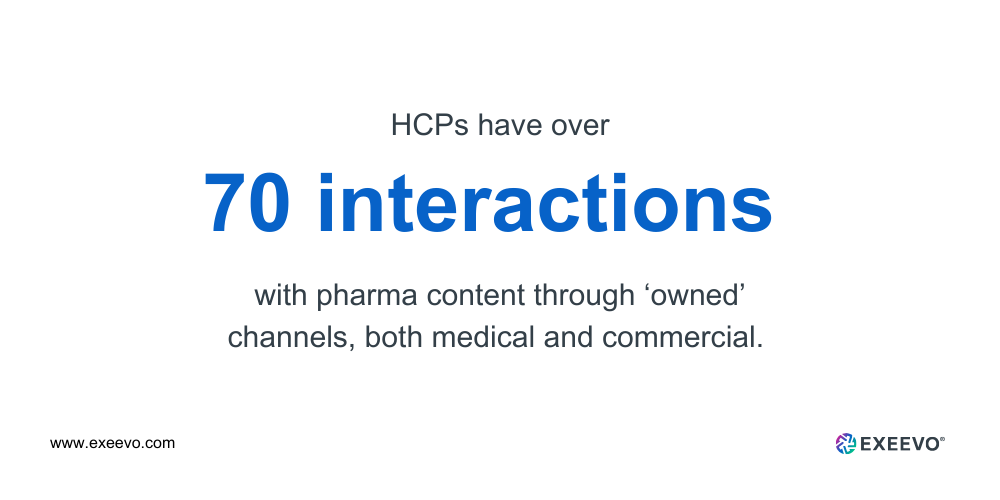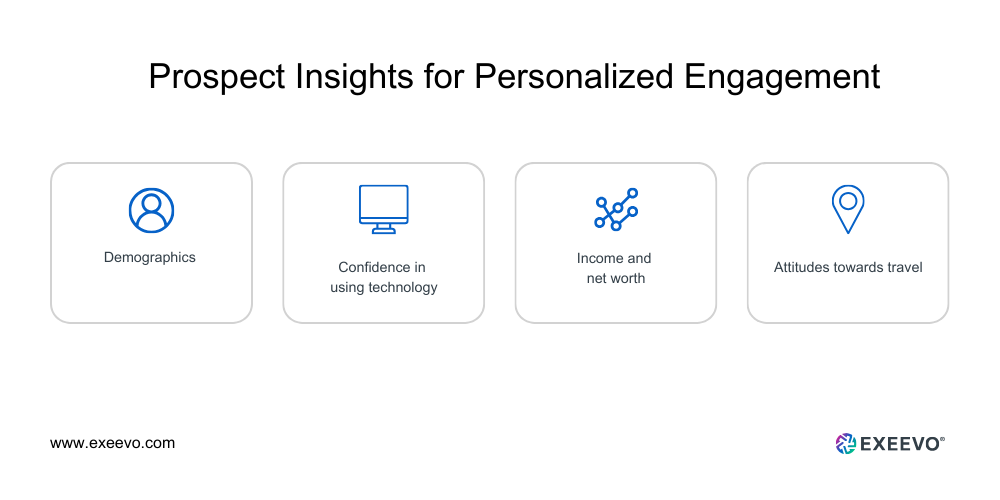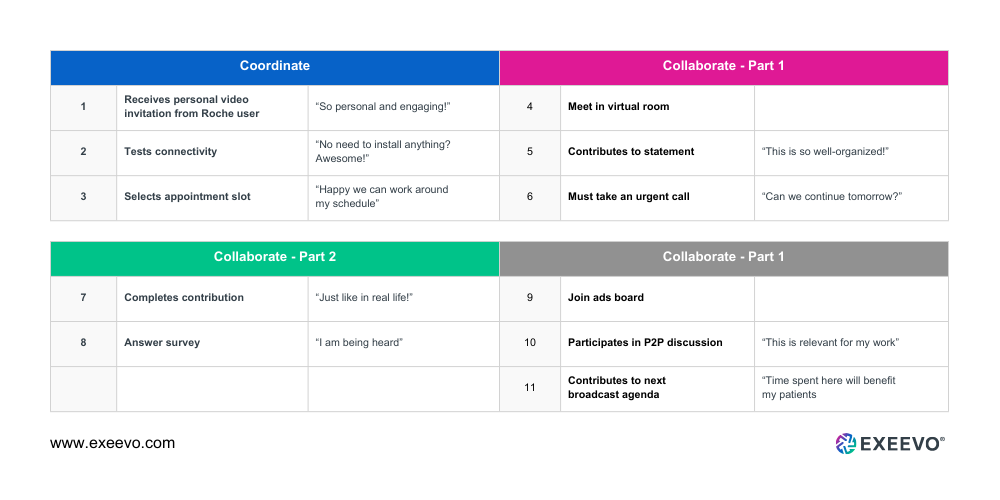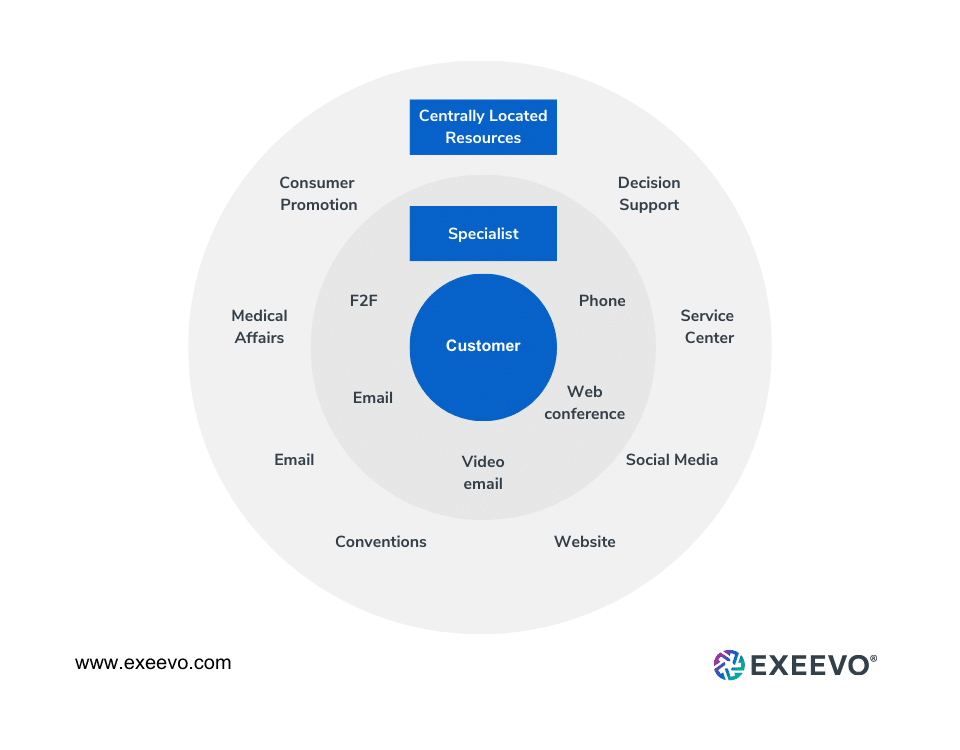The future of HCP engagement in Life Sciences is at a crossroads. The healthcare industry is rapidly evolving, driven by technological advancements, regulatory shifts, patient-driven demands, and the continuous influx of data and insights.
As patient care intensifies and the expectations of HCPs transform, HCP customer engagement in Life Sciences must significantly change.
Post-COVID-19, there’s been an intensified surge in digital integration. For pharma companies, this presents a prime chance to meet healthcare professionals’ increasing desire for comprehensive omnichannel interactions. Each month, HCPs have over 70 interactions with pharma content through ‘owned’ channels, both medical and commercial.
An enterprise CRM solution for the Life Sciences industry, such as Exeevo Omnipresence CRM, has become essential. Device agnostic and built on the power of Microsoft’s 365 Dynamics and 365 Copilot, Omnipresence CRM brings multiple business applications together in one system, coupled with advanced analytics to reveal insights, drive wiser decisions, and bring new opportunities for commercial growth.
Let’s explore HCP engagement in the Life Sciences industry and explain how an enterprise CRM solution can streamline operations and drive commercial growth.
What is HCP Engagement?
HCP engagement is the process of creating meaningful and productive relationships with healthcare professionals.
It involves interactions, collaborations and communications to understand and fulfill their needs and concerns. The aim is to introduce new products or services while providing valuable insights and resources to improve patient care and treatment.
Building strong ties with HCPs facilitates a better understanding of their challenges and requirements. This can help develop more targeted solutions and services.
With an omnichannel approach, HCPs could receive pertinent research updates via email, access patient reports through the app, and participate in online webinars. This approach ensures a consistent, informative, personalized experience across all touch points.
Here’s a real-life example to showcase the power of Omnichannel HCP engagement:
SANOFI China showcases the power of HCP engagement done right. They are committed to innovation and patient care, but outdated legacy and disparate solutions were stifling commercial growth.

They implemented the Omnipresence CRM to improve HCP interactions across all touchpoints, tailoring real-time personalized interactions. The real-time insights allowed them to improve business outcomes and automated processes to promote productivity.
Unifying data into a single source along with advanced analytics and machine learning in Omnipresence CRM gave SANOFI key insights to prompt better decision-making and led to commercial growth. The solution also let SANOFI personalize real-time Omnichannel interactions with HCPs, which enhanced the customer experience.
SANOFI better aligned its operational teams by prioritizing intelligent insights across the customer journey. They were able to strategize sales more effectively to position themselves as an innovative and digitally progressive market leader.
HCP Responsibilities
Healthcare professionals carry out multiple responsibilities. Their contribution helps shape the direction of patient care, medical research, and even the development of new medical technologies
1. Patient Diagnosis and Treatment
In the Life Sciences industry, one of the primary responsibilities of a healthcare professional is to diagnose and treat patients using the most current medical knowledge and practices. This involves a comprehensive understanding of the disease, careful examination of the patient, and selecting the most effective treatment plan.
2. Medical Research
Staying updated on the latest advancements in medical research and technologies is another crucial duty of HCPs. It involves attending seminars, reading research papers, and implementing new techniques and procedures that improve patient outcomes.
3. Patient Education
HCPs also play an important role in patient education. They are responsible for informing patients about their condition, discussing various treatment options, and explaining the benefits and potential risks associated with each option.
4. Collaboration with Pharmaceutical Companies
Healthcare providers often collaborate with pharmaceutical companies to conduct clinical trials and research. Their knowledge and clinical experience contribute to developing and testing new drugs. It makes them instrumental in bringing innovative treatments to the market.
5. Feedback
HCPs provide feedback on medications and medical devices crucial for research and quality assurance. Their real-world experience with these products helps Life Sciences companies understand how they are used in practice, what works well, and what can be improved.
What are the Challenges for HCP Engagement?
Engaging effectively with healthcare professionals presents several challenges for Life Sciences companies. These obstacles can impact the efficiency and outcomes of such engagements.
1. Managing Time Constraints
HCPs face significant time constraints as they balance patient care demands, administrative tasks, professional development, and personal life, creating a busy schedule. These constraints can limit their time to engage with Life Sciences companies. Thus, HCPs might miss the latest information about new products, drugs, or technology.
2. Being Informed
The medical field and pharma industry is a rapidly evolving space. HCPs need to remain updated on a broad spectrum of medical information, including;
- the latest treatments,
- research developments,
- and technological advancements.
This requirement poses a significant challenge, considering the vast amount of information they need to digest.
3. Balanced Patient Interaction
HCPs are responsible for managing patient needs, expectations, and emotions, all while providing high-quality care. This balancing act leaves little time for other critical activities. One is engagements with Life Sciences companies that could enhance their practice.
4. Adhering to Regulatory Compliance
Regulatory guidelines in healthcare are stringent and complex. HCPs must adhere to these rules while managing their patients, as there’s no room for error. The regulations often require extensive paperwork and administrative tasks. These tasks consume time and energy, limiting their interactions with Life Sciences entities.
5. Navigating Ethical Considerations
It’s essential to balance a business’s commercial interests with the primary obligation of HCPs to prioritize patient welfare. Ensuring transparent interactions is crucial to avoid potential conflicts of interest, maintain public trust, and uphold the integrity of clinical decisions.
Digital Solutions Crucial to HCP Engagement Success
Digital solutions are pivotal to HCP engagement success. They bridge gaps in communication, offer immediate data accessibility, and promote continuous growth and collaboration.
These tools enable HCPs to be better equipped to deliver outstanding patient care and stay at the forefront of medical advancements.
Let’s take a closer look at how technology promotes HCP engagement success.
1. The Power of CRM in Streamlining Interactions
CRM systems play a transformative role in streamlining interactions across various industries. They are most important when managing complex relationships, such as those in the healthcare sector.
- They enable comprehensive and personalized customer interactions.
- They automate routine tasks for efficient communication.
- They improve decision-making with real-time data analysis.
- They promote consistent messaging across multiple channels.
Life Sciences companies can track engagement with a CRM to fill the gap in Omnichannel marketing. They can ensure the touchpoints across channels are personalized at certain intersections in the journey. As a result, your dialogue with healthcare professionals becomes more structured and efficient.
CRM solutions also track individual HCP engagement, past communication, preferences, and behaviors. This capability helps companies supply healthcare providers with timely, relevant, personalized information and improve HCP engagement.
2. Harness Data-Driven Insights for Personalized Engagement

Leveraging data-driven insights allows for a personalized approach to engagement. However, solutions like SFDC or Veeva use many data warehouses, which centralize the data and then clean and manipulate it into one data source. This centralization
eliminates the ability to use real-time data, often leading to data loss or insights. Exeevo is the only solution that unifies data from multiple data warehouses into a single source of truth. This helps you optimize insights and interactions with HCPs.
- Identify: Use databases like AMA Physician Masterfile to accurately identify potential healthcare professional targets.
- Target: Utilize geographic location, specialty, and hospital affiliation information to micro-target your audience and tailor the campaign to their specific needs.
- Engage: Deploy a mix of online and offline channels to start conversations, using data to deliver the right message at the right time in the right channel for maximum impact.
With structured data analysis, Account Executives or Field Reps can better understand HCP preferences, needs, and behaviors. It empowers Commercial, Marketing, Medical Affairs, and Commercial Operations to tailor communication strategies.
Life Sciences companies can use HCP engagement platforms to monitor HCP interactions and identify patterns and trends to segment the target audience based on their behavior and preferences. These segments can then receive targeted and personalized communication. It can create a sense of understanding and respect for the HCP’s time and specific interests.
3. Enhance Remote Engagement Capabilities
The digital transformation has enabled Life Sciences companies to engage with HCPs regardless of geographical location. Remote engagement capabilities like virtual events and webinars allow companies to reach out to HCPs and provide flexibility that traditional face-to-face interactions cannot.

Remote engagement tools also allow HCPs to access a wealth of information on demand, such as recorded webinars, informational videos, and other relevant content.
Since 75% of employees are more likely to watch a video than a text, it becomes more effective and enhances the ability of HCPs to stay informed about the latest developments in their field.
4. Utilize CRM Analytics for Effective Engagement
According to Deloitte, the most challenging aspect of the end-to-end HCP engagement process is:
- Usability of the system: Interfacing challenges and lack of intuitive usability in CRM systems can limit efficiency in HCP engagement.
- HCP master data: Accurate, updated, and complete HCP master data is crucial but often challenging to maintain.
- Executing cross-border engagements: Navigating regulatory, cultural, and logistical issues during cross-border engagements can complicate HCP outreach. For example, China has PIPL rules, and you cannot cross border data. Exeevo is the only solution currently compliant in China, as the Microsoft data center is located there.
Cloud-based and real-time-driven CRM systems come to the rescue. They offer robust analytics capabilities that can enhance the effectiveness of HCP engagement strategies.
But, with most CRMs, every department must rely on distinct data warehouses. While most CRMs struggle to integrate this data in real-time, Exeevo stands out as an exception.
Exeevo’s CRM analytics can be instrumental in maintaining HCP master data. You can configure the system to flag inconsistent or outdated information. Additionally, integration with external databases can help validate and enrich HCP data for accuracy and completeness.
CRM analytics can provide insights into regional preferences, language requirements, and legal regulations when executing cross-border engagements. This information can help tailor engagement strategies to specific regions. Moreover, tracking cross-border interactions can ensure regulatory compliance and reduce the risk of violations.
5. Improve Customer Experience Through Omnichannel Marketing
Digital technology improves the customer experience for HCPs. Life Sciences companies can personalize customer engagement by collecting and analyzing data from sources beyond their traditional focus. This could be electronic health records, HCP and patient portals, and wearables.
Digital interactions allow various channels to ramp up or down based on the customer’s and brand’s needs. The following example illustrates how the channel mix works. This can shift from pre-launch to the end of the cycle depending on geographic preferences, where talent is located, market dynamics, and culture.

Healthcare providers can access information, communicate their needs, and give feedback through seamless digital interactions. Moreover, digital platforms provide opportunities for Life Sciences companies to offer digital sales aids (DSA) such as educational resources, personalized content, and on-demand support.
Final Thoughts
As the healthcare industry continues to grow, renewing the approach toward HCP engagement is crucial. It’s no longer a desirable change but a pressing necessity. HCPs carry heavy responsibilities that range from patient care to collaboration with pharma companies.
Embracing digital technology, particularly next-generation CRM platforms like Omnipresence, offers a viable solution. Such platforms leverage data analytics, artificial intelligence, and machine learning advancements to help pharma companies extract valuable insights and drive intelligent decision-making.
At Exeevo, we understand these dynamics and are committed to revolutionizing customer experiences in the Life Sciences industry. Contact Exeevo to learn more about how we can help transform your HCP engagement strategies.
For more life sciences insights and industry trends, don’t forget to check out our Blog.
